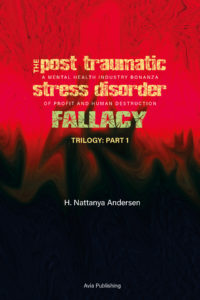I loved the simplicity of this book. There were no obscure medical terms. The author’s first-hand experience gives this book a touch of originality. I observed that the author’s favored modes of treatment might be…
Category: The Post Traumatic Stress Disorder Fallacy Editorial Reviews

This eye-opener account will help readers suss out the truth about the PTSD healing. Booksirens
4/4 Stars
really learnt much from the book and while I may doubt, and at times laugh off, some of the more wonderful aspects of the study, knowing the existence of these things (especially with the knowledge that there are certain people who believe in it) makes it very educational. For example I am a huge skeptic on the claim that someone can know everything about a person just by touching anything they’ve worn at some time or other in their life. But I was not so entirely disbelieving when she put forward the idea that the jewelry or metal we wear influences how we think and react.
3/4 Stars
This book may appear controversial, but quit eye opening and interesting. The opinions expressed by the author are quit brain storming. She strongly tries to convince the reader that the Post traumatic stress disorder diagnosis, treatment together with other medical therapies are exaggerated and overrated. This is further explained by the fact that the PTSD victims having been exposed to these treatment or recovery process, develop long term injuries or rather choose to terminate their lives, while the health practitioners continue to make large profits.
3/4 Stars
By reading the book, the readers can learn many facts and information related to Psychology and Post Traumatic Stress Disorder (PTSD). Even this book has a separate page of bibliography at the end, that contains the resources the writer has referred to when writing the book. The book is a research and a theoretical approach in all aspects, psychologically, biologically, genetically, socially, religiously, etc.
4/4 Stars
favourite part of the book was how the author tackled the MMPI (Minnesota Multiphasic Personality Inventory), a standardized psychometric test of adult personality and psychopathology. She even talked about the results and how they are interpreted. There might be backlash from the medical side of things, but I like how she exposed the methods that seemed like frauds to her.
1/4 Stars
However, later H. Nattanya Andersen begins to talk about supernatural things, spirituality and suchlike high matters. Of course, it is very good that reading spiritual literature helped the author to overcome PTSD syndrome. As the saying goes, a drowning man grabs a straw. Nevertheless, it is somewhat strange to come across extremely lengthy discussions about reincarnation and angels in a book about PTSD syndrome and mental health industry.
4/4 Stars
I love the book since it shades some light on what PTSD is, it’s symptoms, the different treatments and who are the most affected people in the society. I was glued to the book from the very first day. I was so curious to know all the events about PTSD and to say it it’s a deep-gripping and an educative book. It is so overwhelming to the journeyers as they go through a lot before their recovery and some take so many years to get better.
3/4 Stars
This book sends out a bold and clear message suggesting that everyday individuals have to face this alone, not everyone is lucky to have access to help. The book penned by Anderson is designed to allow individuals to not feel isolated and lonely and to understand that they are not alone in the world when dealing with this condition. This education book is written in the first-hand format which allows it to feel original and from a bird’s eye view. This book does have the ability to help individuals overcome barriers similar to those brought forward from the author.
3/4 Stars
I like this book because the author was very open about her situation and what helped her to cope. She was able to discover what was doing the most damage in her recovery and sought to fix what she needed to fix. I also have PTSD so this book really spoke to me and I found it to be very informative and relatable. There were sections in this book that spoke to me specifically and, in a way, helped me.